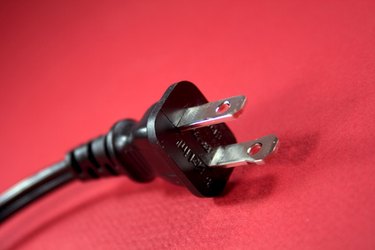Things You'll Need
Appropriate screwdriver or allen wrench
Multimeter
Pliers or de-soldering tool
New electrical cord

Power cords get a lot of usage and, as a result, they eventually wear out, causing shorts in the device to which they are attached. It is very important to keep a multimeter, a small battery-operated device with electrically conductive probes, on hand to test well used power cords, including extension and removable cords. A multimeter can measure voltage, measured in volts, current, measured in amperes, or resistance, measured in ohms.
Testing the Cord
Step 1
Unplug the device and take it apart using an appropriate screwdriver. This could mean using a Phillips driver or even an allen wrench if those are the types of screws used. Save the screws so they can be replaced when the job is finished.
Video of the Day
Step 2
Undo the ends of the wire from inside the device using pliers or, if caps are used, unscrew them using fingers or pliers, depending on the tightness of the cap. Solder may be there so a de-soldering tool should be kept handy.
Step 3
Use a multimeter that is set on resistance times one. If the cord is functional, the meter should read 0 ohms. If the entire length of the cord is bent and stretched out it, should continue to show no leakage. If the multimeter displays wildly fluctuating numbers, the cord is bad and needs to be replaced. When testing wires, press one probe to each exposed wire. It doesn't matter which probe touches which wire. The multimeter itself can be tested by touching the two probes together.
Step 4
Always replace the old cord with a new one of an identical length so that the device will not receive too little or too much power. An excessive variation could damage the device. Also, in the case of a removable cord, one size does not fit all. Check the device carefully to know the size of the plug before replacing the cord.
Step 5
If the cord is removable, a multimeter set to measure resistance is used to test both the male and female ends of the cord. One probe is touched to the male end of the wire and the other probe is inserted into the female end. Just as with the attached cords, these cords should be bent and extended. Zero ohms will be the reading in a good power cord.
Tip
Always use the appropriate tool for the job. Check the screws on the device carefully and always use the correct size and shape of screwdriver.
Warning
Try to keep electrical cords away from house pets. Cats, for example, may chew on power cords. Keep the cords off the floor and hidden behind furniture, if possible.
Video of the Day
- Articles.Techrepublic.com: Power-supply troubleshooting with a multimeter
- Fonerbooks.com: PC Power Supply Failure Diagnostics - Computer ATX Power Supply Troubleshooting and Repair
- Bobvilla.com: Testing Electrical Cords - Electrical Boxes & Wiring, Electrical
- Cabletest.com: High Speed Power Cord Test Systems